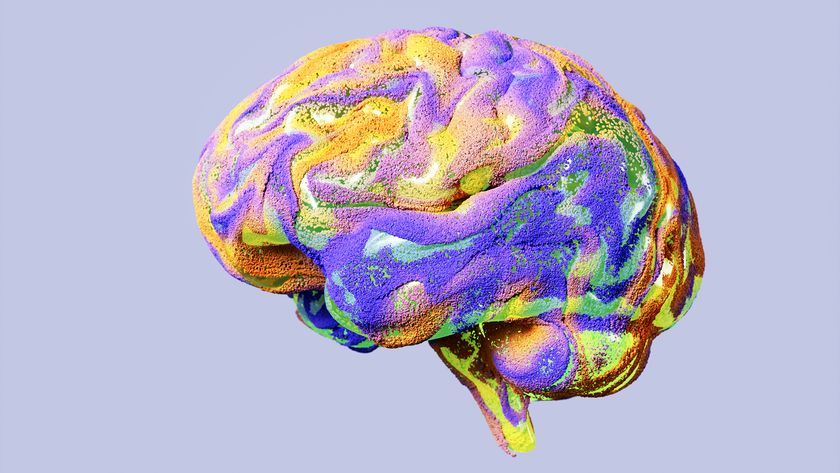And the Verdict Is …? Brain Scans Could Reveal Criminal Intentions

What if lawyers could prove that a person knowingly committed a crime by looking at scans of his or her brain? It sounds like something from a science fiction story, but a new study suggests that we may be one step closer to this reality.
In the study, researchers analyzed brain scans and were able to pinpoint patterns of brain activity that predicted whether people committed certain acts "knowingly," meaning that they knew without a doubt that they were committing a crime; or merely "recklessly," meaning that they were not certain that they were committing a crime.
And although much more research is needed before this type of technique would be reliable enough that it could be used in a court of law, the study suggests that in the future, it may be possible to determine the mental state of a defendant using neuroscience. [10 Things You Didn't Know About the Brain]
The mental state of a person at the time that he or she commits a crime can have major implications, according to the study, published today (March 13) in the journal Proceedings of the National Academy of Sciences.
"Imagine you are a juror in the trial of a defendant who admits to having transported a suitcase full of drugs across international borders," the researchers wrote in the study. "However, you do not know how aware she was of the presence of the drugs in that suitcase. The degree of awareness she had at the time she crossed the border will make the difference to her criminal culpability, and, in turn, to the amount of punishment she faces."
Depending on "which side of the boundary [a person is] on between acting knowingly and recklessly," that person could be sent to jail for years, or released on probation, senior study author Read Montague, the director of the Human Neuroimaging Laboratory at the Virginia Tech Carilion Research Institute, said in a statement.
To determine if there might be a difference in brain activity between someone who did something knowingly compared with doing it recklessly, the neuroscientists recruited 40 people for brain scans. The people asked to imagine themselves in the following scenario: They would have to carry a suitcase — which might or might not be filled with contraband — through a hypothetical checkpoint, according to the study.
Sign up for the Live Science daily newsletter now
Get the world’s most fascinating discoveries delivered straight to your inbox.
In the experiment, the researchers varied the probability that the suitcase the participant would be given contained "valuable content." For example, in one scenario, a participant was presented with five suitcases, only one of which contained contraband. The participant wasn't told which suitcase contained contraband, but because he or she was aware of the risk, he or she would be acting recklessly if they took one of the suitcases through the checkpoint. In another scenario, a participant might be presented with just one suitcase, so he or she would know that it definitely contained contraband.
The researchers found that the patterns of the participants' brain activity differed significantly, depending on whether they were acting knowingly as opposed to recklessly. For example, a part of the brain called the anterior insula was more active when the person knew for sure that he or she was carrying contraband, according to the study. This part of the brain has been implicated in other research that looked at risk and reward, the researchers wrote.
Using a computer model that incorporated the brain scan data, the researchers "were able to predict with high accuracy whether a person was in a knowing or reckless state," based on these patterns, they wrote.
Coming soon to a courtroom near you?
The use of brain scans in the context of law is not new, the researchers wrote in the study. For example, computers have been used to predict if certain individuals met the criteria for psychopathy. In addition, studies have been done that used brain scans to see what happened in the brains of jurors while they deliberated.
But the new findings "suggest that the legally significant conceptions of knowledge (certainty that a particular circumstance exists) and recklessness (awareness of a possibility or probability that it exists) are distinctly represented in the human brain," the researchers wrote.
However, they stressed that their technique "represents a proof of concept, and not yet a usable tool."
There were several limitations to the study, the researchers said. For example, the areas of the brain that were activated during the scans could also be linked to other, unrelated mental states — meaning brain states that have nothing to do with knowledge or recklessness, they said. [Top 10 Mysteries of the Mind]
In addition, larger studies that include a more diverse group of participants are needed, they wrote.
And now that the findings show that there is a difference in brain states when someone is performing an activity, more questions need to be answered, Montague said. Researchers want to know which neural circuits are engaged by this brain activity, as well as how different pharmacological substances or brain injuries would affect these circuits, he said.
"Understanding more about the way our brains distinguish between legally relevant circumstances in the world has the potential to improve what, up until now, has been the law's guesswork about the way in which certain mental conditions might impact criminal responsibility," the researchers wrote.
Originally published on Live Science.













